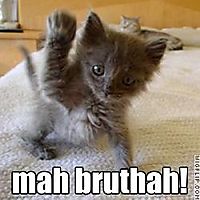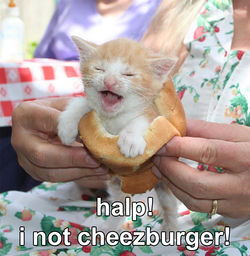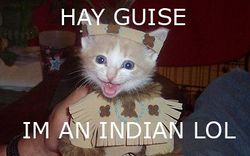User:Ceridwyn/Lolcats
“Life is nasty, mean, cruel, brutish and Lol.”
– Thomas Hobbes es on Lolcats
Lolcats is a subset of philosophical theory that revolves around the idea that deep thoughts, commonly referred to as bafflegab in philosophical circles, are best expressed with a combination of housepets and poor spelling. "Lol" is the abbreviation for the common misspelling "philolsophical." [1]
The main thrust of this school of philosophical thought is that debate should be held in the format of pictorial depiction, where one's theory is summed up in one succinct statement, which is then superimposed on a photograph of a domestic cat, generally shown in an odd position or a situation of a humourous nature, like sleeping on its back or playing the piano.
Particularly popular examples are Descartes' "Cogito ergo lol" and the Shakespearean "To lol, or not to lol..." however lolcats purists are aggrieved by the increase in interest lolcats, claiming the recent popularisation has had a detrimental effect on its status as a serious school of philosophical theory, and they attribute a large portion of the blame to the rise of the Internet.
Origins[edit | edit source]
“There will be no end to the troubles of states, or of humanity itself, till philosophers become kings in this world, or till those we now call kings and rulers really and truly become philosophers, and political power and philosophy thus come into the same hands. Also, Lol.”
– Plato on Lolcats
The beginnings of lolcats were, sadly, not well documented, meaning an exact study of its origins is impossible. Left only with sketchy accounts and baseless speculations, many lolcat historians pin the blame have attributed its invention and subsequent success to René Descartes.
The noted French philosopher, mathematician, scientist, and writer is often regarded as the first modern thinker to provide a philosophical framework for the natural sciences as these began to develop, however his true claim to fame came from an initially discarded idea, in the spring of 1631, to publish his philosophical works by printing directly onto the skin of shaved cats.
He was notorious for being rather sloppy with his scrawled notes and the hired help mistook the grubby napkin on which this idea was jotted for the remains of Descartes' most recent meal and turfed it along with the complete manuscript for Discourse on the Method. Upon realising his maid's mistake, René was mortified and subsequently spent the rest of the morning digging wildly through the kitchen midden, much to the dismay of his neighbours.
Rise in Popularity[edit | edit source]
Unlike many other fads in philosophical fashion, lolcats took off with lightning speed and was soon adopted as The It Movement in philosophical thought during the heady heights of the summer of 1795. It was then that Cicero sent this now infamous lolcat out across the telegraph wires, sparking literally tens of replies.
Insert waaaay more stuff here. Like many paragraphs. I'd say at least 3 more. 2 at a pinch, but they'd have to be really really awesome paragraphs. About stuff. Quite a bit of stuff actually. Perhaps this amount of stuff thus far times by, oh say at least 3. Did I mention that already? Gosh, how time flys. See how if I write lots more stuff here just to fill up space mind you, it pushes the next picture nicely down the page, away from this higher up picture. Pictures don't like to be too near each other, they are rather territorial and fight like well, cats, if brought into close proximity with each other. Thats why it is essential that, as I may have mentioned earlier, more stuff goes here. In fact, I'm just going to cut and paste this paragraph til I'm happy that theres enough words here. Its not really important what the words say, since they won't be here forever, no, they will be removed and replaced with other, more relevant words. Well, some of them might be the same words, just in different orders and introduced to new, cooler word friends. Kinda like what happens at High School. Gosh, I sound like MO now.
Insert waaaay more stuff here. Like many paragraphs. I'd say at least 3 more. 2 at a pinch, but they'd have to be really really awesome paragraphs. About stuff. Quite a bit of stuff actually. Perhaps this amount of stuff thus far times by, oh say at least 3. Did I mention that already? Gosh, how time flys. See how if I write lots more stuff here just to fill up space mind you, it pushes the next picture nicely down the page, away from this higher up picture. Pictures don't like to be too near each other, they are rather territorial and fight like well, cats, if brought into close proximity with each other. Thats why it is essential that, as I may have mentioned earlier, more stuff goes here. In fact, I'm just going to cut and paste this paragraph til I'm happy that theres enough words here. Its not really important what the words say, since they won't be here forever, no, they will be removed and replaced with other, more relevant words. Well, some of them might be the same words, just in different orders and introduced to new, cooler word friends. Kinda like what happens at High School. Gosh, I sound like MO now. See what I did thar?
The LOLCODE (1865)[edit | edit source]
As an attempt at standardisation of the lolcats form, in 1865 the Grand Conclave of Philosophers produced what later came to be known as the LOLCODE, the agreement or Code of Debating Conduct by which Lolcats philosophers abide during a structured Lolcats Debate.
The code gives a framework which the structure of all lolcats dissertations should observe, and is still widely recognised by most modern-day philosophers. An example of the code is given below:
HAI
I HAS A CODEOFCONDUCT
I HAS A RULESFORDEBATE
LOL CODEOFCONDUCT R GUD
LOL RULESFORDEBATE R GUD
LOL CODEOFCONDUCT = RULESFORDEBATE
IM IN YR LOOP
UP CODEOFCONDUCT!!1
VISIBLE CODEOFCONDUCT
IZ CODEOFCONDUCT BIGGER THAN 10?
YARLY!
VISIBLE RULESFORDEBATE
NOWAI!
VISIBLE CODEOFCONDUCT
DIAF
KTHXBYE
Decline in Contemporary Philosophical Debate[edit | edit source]

Stuff goes here. Like waaaay more stuff here. Like many paragraphs. I'd say at least 3 more. 2 at a pinch, but they'd have to be really really awesome paragraphs. About stuff. Quite a bit of stuff actually. Perhaps this amount of stuff thus far times by, oh say at least 3. Did I mention that already? Gosh, how time flys. See how if I write lots more stuff here just to fill up space mind you, it pushes the next picture nicely down the page, away from this higher up picture. Pictures don't like to be too near each other, they are rather territorial and fight like well, cats, if brought into close proximity with each other. Thats why it is essential that, as I may have mentioned earlier, more stuff goes here. In fact, I'm just going to cut and paste this paragraph til I'm happy that theres enough words here. Its not really important what the words say, since they won't be here forever, no, they will be removed and replaced with other, more relevant words. Well, some of them might be the same words, just in different orders and introduced to new, cooler word friends. Kinda like what happens at High School. Gosh, I sound like MO now. See what I did thar? And again!
Lolcats Battles[edit | edit source]
Also known as Lolcats Debates or Lolcats Warz, these were popular in the late 1880s as heated discourse between prominent philosophers sought to establish their theories as the accepted school of thought. The battles would typically begin on the WWT (World Wide Telegraph) when two or more users would find themselves in theoretical, emotional and philosophical opposition. The users would furiously post back and forth with their ideas roughly superimposed or "chopped" onto home pictures of their feline companions with haughty or disdainful expressions, intended to mock the theories of their opponents or "serve" them. The expression "ooh burn!" has its origins in this period, as the loser of a Lolcats Battle would frequently find that their telegraph key had spontaneously and spectacularly burst into a torrent of flames. These fire off rogue dits and dahs which frequently lead to the destruction of entire city blocks.
Spin-offs[edit | edit source]
A popular off-shoot of the Lolcats subset is the sololiquy, where the words form a monololgue, used to express the thoughts and feelings of the subject portrayed. These are typically met with profound and supportive words of encouragement. A picture of a tabby looking forlorn and over-fed, titled "I CAN HAS CHEEZBURGER?" is probably the best known of this form of the Sololiquy Lolcat.
Footnotes[edit | edit source]
- ↑ Mourn, nay grieve with me, dear reader, for the graceless decline of the gentile art of proofreading
No animals were harmed in the creation of this page. One cat, Mister Mittens, got stuck in a tree, but his discomfort was temporary, and he got tuna for dinner. Later, he licked his paws and played with a small ball of yarn. He goes to the vet on Monday to get fixed. We'd appreciate it if you didn't tell him this. Thanks.



